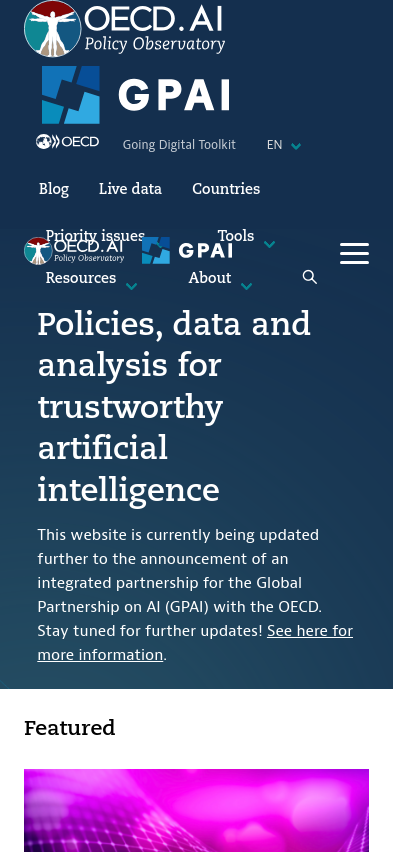⚡ZurzAI.com⚡
AI Start Ups Your Should Know
OECD.AI

OECD.AI is an organisation focused on promoting innovative and trustworthy artificial intelligence through various initiatives, analysis, and collaboration with global partners.
The document provides a comprehensive overview of the activities and initiatives of the Organisation for Economic Co-operation and Development (OECD) related to Artificial Intelligence (AI). The company focuses on laying out the ground for responsible and trustworthy use of AI technologies. Here are some main themes and areas of focus:
AI Risk & Accountability
- Overview: The content underscores the importance of establishing accountability in AI systems.
- Risks Outlined: Potential harms include bias, discrimination, manipulation, privacy infringement, and surveillance.
- Action Steps: The Expert Group on this theme explores risk management frameworks and policy coherence to ensure AI systems are publicly accountable.
Data Privacy & Governance
- Significance: The OECD emphasizes the critical role of privacy and data protection laws in fostering trustworthy AI.
- Data Management: It focuses on safe collection, sharing, and deletion practices in a way consistent with human rights and inclusion principles.
- Expert Insights: Multidisciplinary experts collaborate to align AI uses with international privacy standards and data governance policies.
Generative AI
- Challenges and Opportunities: While acknowledging generative AI's transformative potential, it also highlights associated risks and socio-economic impacts.
- Policy Development: Reports are commissioned to help manage these risks and understand the newer domains of AI applications.
Future of Work
- Impact on Employment: AI's role in transforming workplaces and employment dynamics is scrutinized with the potential for both beneficial innovations and disruptive impact.
- Projects in Focus: Initiatives involve understanding AI's transformative effects on global labor markets, with a highlight on sectors like agriculture and healthcare.
Measuring AI: The AI Index
- Objective: Establish a comprehensive framework for assessing the reliability and application of AI technologies within member countries.
- Global Collaboration: The framework is developed in partnership with international AI experts to ensure it is comprehensive and authoritative.
AI Compute & Climate Impact
- Environmental Costs: There's a focus on understanding the environmental impacts of AI computing demands, particularly supercomputing.
- Sustainability Measures: Efforts are geared towards creating a framework to track and mitigate AI's carbon footprint.
AI & Health
- Healthcare Utilization: While viewed as a solution to pressing health challenges, there are concerns about data privacy and algorithm reliability.
- Policy Guidance: Advice for policymakers focuses on ensuring AI in healthcare is implemented responsibly and enhances public health.
Trustworthy AI Tools & Metrics
- Catalogue: A collection of tools and metrics is promoted to help build AI systems that are fair, transparent, explainable, and robust.
- Availability: This repository serves as a resource for those developing AI to ensure adherence to human rights and safety standards.
Incidents Monitoring
- Global Reporting: The OECD tracks AI incidents as a part of a global press monitoring system to gain insights into risks.
- Interoperability: A common framework is being developed so these incidents are consistently reported and monitored worldwide.
Education and Awareness
- Public Engagement: The company's webpage is designed to enhance public dialogue about AI's future, inviting input and discussion across various sectors.
- News and Resources: It consistently updates stakeholders on AI policy matters, providing real-time developments through blogs and reports.
The overarching mission emphasizes cooperation across governments, industries, and academic sectors to promote the safe, responsible, and innovative use of AI technology globally. The OECD remains committed to aligning AI with international human rights and sustainable development goals, assuring that AI technologies foster economic growth while minimizing potential societal harms.